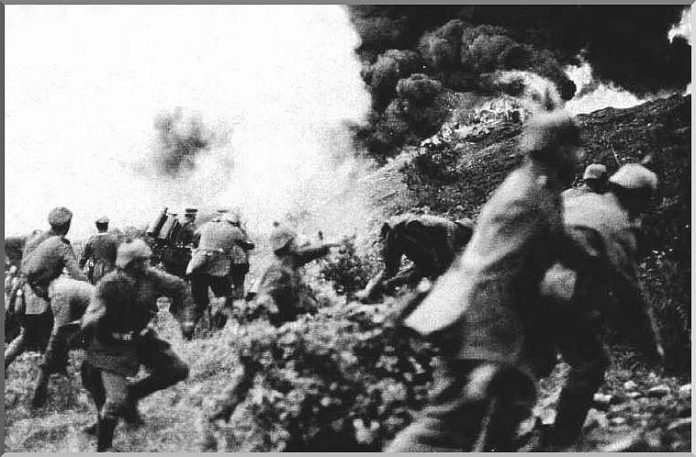As the credits after the film roll by, another army appears—of technicians, musicians, stunt men, cinematographers in England, France, Holland and the United States—active behind the scenes in order to capture on the screen the anguish of English and French soldiers hoping against hope to escape from the coast of France across the Channel to the relative safety of England. The efforts of that second army were not in vain, for the mise-en-scène and the cinematography are superb in their portrayal of the evacuation of three-hundred-thousand soldiers in the course of a week in the spring of 1940. Sea, air and land (on the beaches and the mole): each brings its own perspective to the delivery of the British force, more or less intact, from what could have been a massacre. Early in the film Winnant, a British colonel, accounts for the anomalous inaction of the Germans in leaving the stranded French and English armies (relatively) unmolested on the shore: “Why use tanks when their planes can destroy us at will? It’s like shooting fish in a barrel.” His comments and those of his naval counterpart, Commander Bolton, function like the occasional prose panels in a silent film, when more information is required that can be conveyed by gesture alone. The comparison is apt for, with minimum dialogue, the emphasis is on action, reminding us why they are called “motion pictures.”[1]
The miracle of Dunkirk is one of the best-known incidents of World War II. How then is the director to convey the tension and uncertainty of the actual event? Nolan’s method is to focus on individual incidents presented within the larger scenario. We begin with two young soldiers, one of whom is French concealing his identity in a British uniform. As we follow their continual and frustrated attempts to find passage to England we witness in the concrete the desperate attitude of every other soldier waiting on that beach. Theirs is a journey fraught with difficulty, for they do board a ship only to have it bombed or torpedoed. The French solider is among the drowned, but Tommy, the proto-typical “tommy,” eventually makes it to England.
Another entry into the drama is provided by the trip across the channel of a small private craft, the Moonstone, manned by Mr. Dawson, his son, Peter, and an impulsive lad, George, who jumped aboard as the ship was leaving the pier. Along the way they—and we with them—encounter incidents that make palpable the larger scene. At one point they rescue a shell-shocked solider stranded on the wreckage of a ship whose berserk behaviour leads to George’s death, an incident that demonstrates that any loss of life, even of a single person, is irreparable. Later they watch in horror as a corvette crowded with soldiers is sunk by a German plane. Many of the oil-soaked survivors, including Tommy, are taken aboard. A pilot, too, trapped in the cockpit of his downed spitfire is extracted from the flooded cabin by the Dawson boy. Thus loaded, the boat returns to England without having reached the coast of France, unlike the fleet of small craft approaching the beach at Dunkirk at the climax of the film, whose gradual appearance seems at first more a vision than a fact.
The camera work that accompanies the Royal Air Force into action is so beautiful that a viewer may forget for a moment that these spitfires had been sent aloft to down enemy planes. The German pilots are never seen. Anonymous, they simply do not exist as human beings but only as a collective entity known as “the enemy,” mere cogs in the Nazi war machine, while the British are portrayed as real persons, noble individuals who are defending their country against a barbarous onslaught. Again, as with the single ship, individual episodes illumine the larger picture, as we see in the camera’s following the pilot of a downed spitfire or another who engages the enemy until the gas tank is empty. His plane then coasts to a landing on the French coast where, having destroyed the plane, the pilot is marched off by a few shadowy German soldiers, their only appearance in the film.
The full-scale evacuation is presented in shots of long lines of soldiers on the beaches, waiting for they know not what, like a grotesque parody of a queue in a mad country where no buses run. Larger ships arrive to carry off first stretchers and then wounded men still standing, but not our two would-be escapees despite their desperate attempts to board ship. In one gruesome scene, the conviviality of the men packed below deck is shattered when a torpedo strikes and the cabin is instantly flooded, with most of the men and women drowned. The viewers’ reaction to the ongoing drama is guided by the interchanges between Winnant and Bolton, who from the quay express their frustration in their inability to act and their incredulous relief as the motley British fleet enters the harbour. The final scene in England contrasts the grim reality of Dunkirk with the unscarred beauty of the English countryside and the beaming faces of people as of yet secure. In a scene, heavy with irony, as Tommy reads in a monotone Churchill’s famous speech—“We shall fight them on the beaches. . . . We shall never surrender”—, the camera moves to the body of a drowned solider washed by the waves at Dunkirk.
Dunkirk raises but does not address the question of why there is war at all, why war has been a constant in human history as long as there have been men to fight. How does one learn to regard another nation or another race as totally alien, without distinction of sex or age, with the result that each side sets out to annihilate the other?
Can anything be more absurd than that a man should have the right to kill me because he lives on the other side of the water, and because his prince has a quarrel with mine, although I have none with him?[2]
The paradigmatic society for which war is a way of life is the tribe, as we find it described, e.g., in the Bible. The fundamental conviction is that the entire folk has a single personality, forming, as it were, a single person. That attitude accounts for the fact that the virtue or vice of a single member affects everyone, as with plague on the Israelites at Shittim (Numbers 25:1-10) or at the time of the census commissioned by David (2 Samuel 24). At the taking of Jericho the Hebrews under Joshua had been commissioned to slaughter men and women, young and old, infants at the breast (Joshua 6.21). I cannot here go into the theological discussion of the place of “the ban” in the process of God’s revelation beyond noting that he showed himself to a people as they were and then developed in them the principles that eventually led to the Gospel message of the Prince of peace.
It was this tribal mentality in ancient Greece and Rome that accounts for many of the practices of those societies that, not so very long ago, would have been regarded as unreasonable as well as immoral. The exposure of infants, by which female and (deformed) male babies were left in the open to die, was owing to the fact that, back then, only men were admitted into the army. Tribal life was centred on the army, with the warrior—an Achilles or a Hector—what the whole of society was designed to produce and honour (when successful) or shame (when not). War with neighbouring peoples was taken as the reason the tribe existed, with the consequent extermination of the losing side or, as in Euripides’s The Trojan Women, the slaughter of men and boys and the enslavement of the women. The clans of the Scottish Highlands may be classified as one such society, and historically France and Germany, with Great Britain a willing third would be another. Even so, there have been incidents in which the irrational loyalty to the tribal identity has been shaken, as in the Christmas-eve encounter between the German and English troops in a mysterious interlude to the carnage of the First World War in 1914[3] or, to take an individual case, when a British soldier, himself a Catholic, is said to have found a rosary on the body of the German soldier he had just killed and, suddenly, Pascal’s Pensée sprang into life.
War may be reprehensible as aggressive or justifiable as defensive:
The cheapest and most childish of all the taunts of the Pacifists is, I think, the sneer at belligerents for appealing to the God of Battles. It is ludicrously illogical, for we obviously have no right to kill for victory save when we have a right to pray for it. If a war is not a holy war, it is an unholy one—a massacre.[4]
Nevertheless, what may have begun as a legitimate defence against armed aggression soon degenerates, inevitably it seems, into a brutality that equals or surpasses that of the enemy. The bombing of Dresden in World War II would be an instance, captured brilliantly in Kurt Vonnegut’s Slaughterhouse Five; another is Ride with the Devil, a movie set in the American civil war, which shows the descent into arbitrary violence of a group of men who initially acted only to protect their families and homesteads. It is worth noting that the Iliad, the greatest war epic of all time, is subtly unsympathetic to the conquering Greeks, in the contrast Homer draws between the vicious and vindictive Achilles and the noble self-sacrificing Hector.
The poet has so conceived the poem that his sympathies apparently, and those of his reader certainly, are on the side of the vanquished rather than of the victor. . . . Achilles had some status as a sort of demigod in pagan times; but he disappears altogether in later times. But Hector grows greater as the ages pass; and it is his name that is the name of a Knight of the Round Table and his sword that legend puts into the band of Roland, laying about him with the weapon of the defeated Hector in the last ruin and splendour of his own defeat.[5]
There is another aspect of warfare that Etienne Gilson has described in his pamphlet The Terrors of the Year Two Thousand: the intoxicating exercise of arbitrary power:
Quis ut Deus? It is I, says man. When we no longer want to be the image of God, we still can be his caricature! . . . man has the proud conviction that the day is perhaps not far off when he himself will be able to explode the planet. Let us admit that the adventure is enticing. You press a button, and the earth bursts like a gigantic bomb whose pulverized fragments are lost in a shower of stars which the startled eyes of the Martians—if there be any—will see shooting through the night into space. As a child who amusing himself by breaking his toy for no reason at all, just to see what it is like inside, so man will have smashed the world.[6]
Let the earth split in two and crash flaming into the sun. No matter if Nietzsche’s superman can say, “I have done this.” The more perfect the object, the greater the thrill in destroying it. This primitive, unconscious urge seems to show itself especially in times of war. Hitler bombed London, not only to weaken the morale of the English but also to destroy a quite marvellous human artefact: the city itself. And readers of Patrick O’Brian or Alexander Kent cannot escape the suspicion that the perfect condition of a man-of-war in 1812, with every spar, every piece of rigging in place and the boat sparkling in glorious trim, was so maintained either to be blown out of the water itself or to inflict that destruction on an equally magnificent enemy ship.
You [Mars], gorged on this endless game of war, still thrilled
at battle clang and glare of helmets, the grim
face of the Moorish foot-soldier head to head
with his enemy bleeding.[7]
These characteristics have been made evident in our own day. The tribally minded Muslim warriors of the Taliban or ISIS indiscriminately attack “the enemy,” conceived of as a single entity without distinction of age or status, innocence or guilt; but they also gleefully demolish artistic and cultural monuments of the past. They may claim to be following a religious mandate, but a perverted pleasure in destroying is no doubt an element of their actions. Sufficient confirmation, if any be needed, of this destructive impulse in man, is merely to mention Kim Jong Un, with his reckless willingness to unleash horrors unknown since Hiroshima. Appeals to reason or the pressure of economic sanctions will not halt the madness of a man drunk with the ability to frighten his neighbours—which in this case compromises the whole of mankind—and to destroy them, even at the price of ruination for himself and his nation. An image of this sub-conscious desire for self-annihilation in attacking the foe occurs at the end of Dr. Strangelove or: How I Learned to Stop Worrying and Love the Bomb when a crew member of the Enola Gay jumps up onto the atomic bomb as it is being dropped on Hiroshima.
One may be tempted to counter the pessimism exhibited in the preceding paragraphs by noting that the “tribes” of Europe—France, German and England—have not warred for more than seventy years. Liberals will point to the fact with some pride, in that capitalism has brought prosperity and tolerance to these traditional enemies. The other side of the coin, however, may show that indolence may have robbed them of their energy: “There’s nothing worth fighting for; and as long as my oasis of ease and comfort is secure amid the turmoil of a mad world, I care not what happens elsewhere.” Let me here invoke that always useful, if overused image of ancient Rome. In the early days of the Republic, every male was a Cincinnatus who would leave his farm to defend the nation and then return to it, victory achieved. But in the late Empire, foreign mercenaries were employed to guard the frontiers while the effete Romans stayed home.
War is the simplest remedy for the malaise, as in film The Hurt Locker. In it, Sergeant First Class Will James re-enlists, preferring the dangerous work of defusing bombs to trailing his wife and infant child through the luxurious setting of an American supermarket. But religion, in the spiritual warfare Saint Paul described, can also provide an effective summons to cast of the soft garments of indolence for the rigours of a campaign of a different sort; the Salvation Army and the Company of Jesus would agree. This power of religion to harness the belligerent instincts of man appears in the perennial appeal of the ascetic Saint Francis. And, in another way, we may invoke the intellectual life as found in Saint Thomas Aquinas. He combined two calls to greatness, one in the austere religious life of the first Dominicans and a second in his position at the newly founded University of Paris. Thus, Francis and Thomas answered a summons to heroism apart from the battlefield. More broadly, the intellectual life, as in scientific research, can require as complete a commitment from its practitioner as that of a soldier at the front. The characteristic of all of these is self-sacrifice; and the greater the calling, the more extensive will be the response. Each, in its way, requires the participant to abandon family and ease, with the real possibility of never recovering them, but the surrender of these good things must be made to achieve something of equal or greater importance. Without that goal, the sacrifice will be useless. A brilliant rendition of a spoiled life is found in Kazuo Ishiguro’s The Remains of the Day. The story, set in the 1930s, focuses on Stevens, the butler, who had given himself totally and absolutely to the efficient management of Darlington Hall, only to discover that his life had been wasted in the service of Lord Darlington, a Nazi sympathizer. His commitment, admirable in itself, was thoughtless in that Stevens, exclusively occupied with matters of secondary import, had no larger goal in view. The power of religion lies in its providing an object as worthy of sacrifice as the demands made by war, learning, or culture.
[1] Robert Bresson, the innovative and influential French director, once told an interviewer that movies should resort to dialogue only when it was needed to supplement the camera. Terrence Malick, especially in his recent films, has clearly accepted and acted upon this principle.
[2] Se peut-il rien de plus plaisant, qu’un homme ait droit de me tuer parce qu’il demeure au delà de l’eau, et que son prince a querelle contre le mien, quoique je n’en aie aucune avec lui? Blaise Pascal, “Pensées,” Œuvres completes, edited by Jacques Chevalier (Gallimard: Paris, 1954), “Pensée 290 [167],” p. 1162.
[3] The incident was celebrated in the film Joyeux Noel (2005).
[4] G.K. Chesterton, “October 23, 1914: The God of Battles,” The London Illustrated News, 1914-1916 in The Collected Works, vol. XXX (Ignatius Press: San Francisco, 1988), p. 307.
[5] G.K. Chesterton, The Everlasting Man (Doubleday/Image: New York, 1955), p. 82.
[6] E. Gilson, The Terrors of the Year Two Thousand (University of Saint Michael’s College: Toronto, 1984), pp. 11-12.
[7] [Mars] heu nimis longo satiate ludo,/quem iuvat clamor galeaeque leves/acer et Mauri peditis cruentum/vultus in hostem. Horace, “Ode I.2,” translated by Rosanna Warren in Horace The Odes: New Translations by Contemporary Poets, edited by J. D. McClatchty (Princeton University Press: Princeton, 2002), pp. 20-21.












